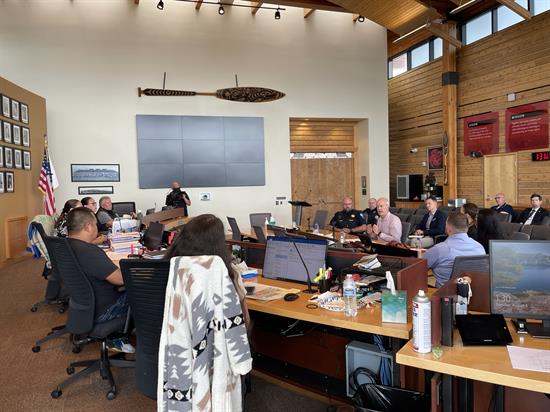Press Releases
Larsen Introduces Bipartisan PROTECT Act to Give Tribes More Tools to Combat the Opioid Crisis
Washington, D.C.,
August 8, 2024
Rep. Rick Larsen (WA-02) introduced the Protection for Reservation Occupants against Trafficking and Evasive Communications Today (PROTECT) Act, bipartisan legislation to give Tribal courts and law enforcement more tools and resources to combat the opioid epidemic.
WASHINGTON, D.C. – Rep. Rick Larsen (WA-02) introduced the Protection for Reservation Occupants against Trafficking and Evasive Communications Today (PROTECT) Act, bipartisan legislation to give Tribal courts and law enforcement more tools and resources to combat the opioid epidemic. Reps. Ryan Zinke (MT-01), Tom Cole (OK-04), Adam Smith (WA-09), Derek Kilmer (WA-06), Marie Gluesenkamp Perez (WA-03) and Sharice Davids (KS-03) also joined as original cosponsors of the legislation. Larsen and Tribal leaders emphasized how the PROTECT Act enables Tribal courts and law enforcement to hold drug traffickers accountable to build safer and healthier communities. “The opioid epidemic has devastated Tribal communities in Northwest Washington,” said Rep. Larsen, who met with the Tulalip Tribes this week to discuss the bill. “Tribes in my district have told me about the unique challenges their courts and law enforcement face to hold drug traffickers accountable. The PROTECT Act takes significant steps toward addressing the many concerns I hear. I will continue to partner with Tribal leaders in Northwest Washington to help communities regain the momentum to combat the opioid epidemic and save lives.” “The opioid and fentanyl epidemic is harming all citizens in Washington State. Our reservations are no different. Our Tribal lands are being targeted by organized crime because of the jurisdictional complexities and other vulnerabilities. The PROTECT Act of 2024 restores Tribal criminal jurisdiction over non-Indians for drug trafficking within our reservation boundaries, helping protect not only the residents on our reservation, but all Washingtonians,” said Teri Gobin, Chairwoman, Tulalip Tribes. “The Affiliated Tribes of Northwest Indians supports the PROTECT Act of 2024, a bill that strengthens tribal criminal justice systems to help combat the opioid-fentanyl epidemic that is devastating our tribal communities. We urge Congress to move swiftly on this bill,” said Leonard Forsman, President, ATNI. “For the past few years, Tribes have been urging Congress to move forward with legislative fixes that recognize our sovereignty and restore jurisdiction over non-tribal predatory drug dealers who are causing great harm at Lummi Nation. We thank everyone who has played a part in making this happen,” said Anthony Hillaire, Chairman, Lummi Nation. “This legislation is important for three key reasons. First, this bill will enhance our ability to investigate crimes, which in turn will help ensure the safety of our community. This bill will allow our Tribal law enforcement to utilize the prompt review by a Swinomish Court judge of a request for a search warrant of social media platforms that will be honored by the platforms, and as a result we can quickly tackle incoming drugs and other illegal activity. Second, this bill helps restore the inherent sovereignty of Tribes by recognizing Tribal criminal jurisdiction over offenses involving drugs and firearms. Restoring Tribal criminal jurisdiction over these offenses will allow for swift and certain repercussions for those who are violating the criminal drug and firearms laws of the Tribe. Third and finally, the ability to utilize the Bureau of Prisons Tribal Prisoner Program (BOP) provides access to a potentially useful resource for Tribes,” said Steve Edwards, Chairman, Swinomish Indian Tribal Community. “The Colville Tribes' law enforcement agency has long been hampered by the omission in federal law that does not allow our tribal courts to compel social media companies to turn over information necessary for our officers to investigate crimes. The PROTECT Act would provide tribal courts this authority and, in the process, allow investigations to proceed faster and more efficiently,” said Jarred-Michael Erickson, Chairman, Confederated Tribes of the Colville Reservation. “Any additional tools that Congress can provide us to keep our community safe is a welcome change. The amendments in this bill will assist tribes in fighting the fentanyl epidemic, which will help Indian Country and surrounding communities. We are all safer if we can reduce the effects of drug crimes and related violence that is taking out our youth in unprecedented numbers,” said Dustin Klatush, Chairman, Confederated Tribes of the Chehalis Reservation. How the PROTECT Act Works According to the CDC, in 2020 and 2021, American Indians and Alaska Natives had the highest drug overdose death rates of any racial or ethnic group in the United States. Tribes across the country have emphasized the need for additional tools and resources to ensure drug traffickers cannot take advantage of jurisdictional loopholes to evade accountability. Specifically, the PROTECT Act:
For text of the PROTECT Act, click here. Larsen is Focused on Combating Opioid Crisis in Northwest Washington Larsen is focused on supporting local efforts to combat the opioid crisis and save lives. Earlier this year, he introduced a districtwide opioid report that outlines a four-pillar framework to combat the crisis. Last month, Larsen introduced the Workforce Opportunities for Communities in Recovery Act with Rep. Pramila Jayapal (WA-07) and Sen. Edward Markey (D-MA) to create employment opportunities for people in recovery and support communities impacted by widespread opioid use. Larsen plans to introduce two additional opioid-related bills to provide funding opportunities for multijurisdictional drug task forces and to support harm reduction initiatives. ### |

